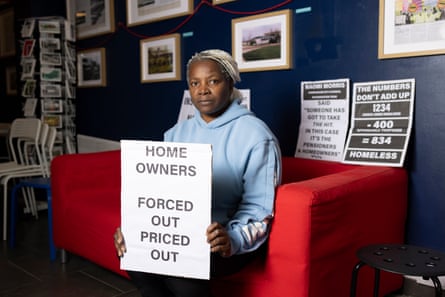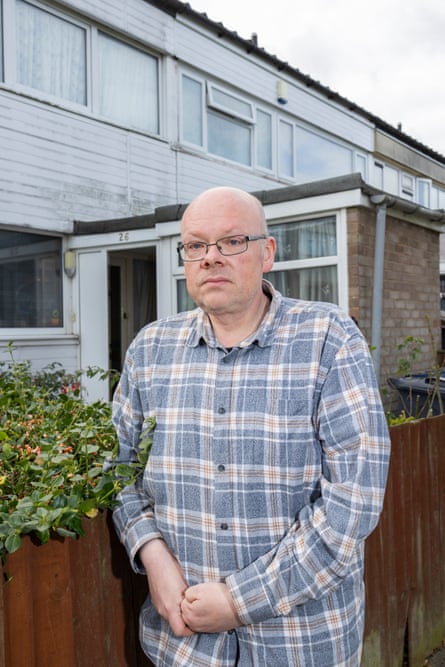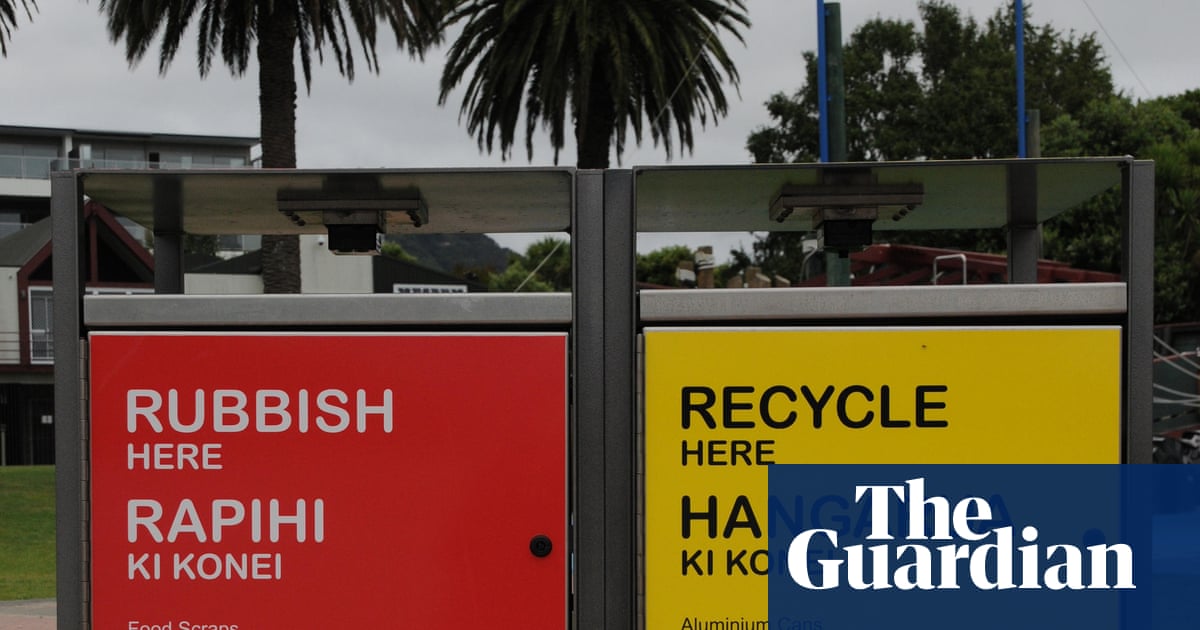Xylia Legonas was just a few years off fully repaying her mortgage, and had just finished refurbishing her house after a fire, when someone knocked on her door in 2023 and asked if she was aware of the Druids Heath regeneration project.
“The first thing I thought: ‘Don’t tell me you’re going to knock my house down’,” she recalled. “He basically said yes and I thought: ‘What am I going to do? Where am I going to go?’”
After years of discussions, councillors have now approved planning permission to knock down most of Druids Heath, a postwar housing estate on the southern edge of Birmingham, to create higher density housing.
In total, 1,800 homes will be demolished to make way for 3,500 new ones, 400 (11%) of which will be designated as affordable, according to the planning documents – 800 fewer than there are now.
This was the main point of contention at the planning committee meeting in which dozens of Druids Heath residents crammed into the room and adjoining corridor to voice their anger – shouts of “these are our homes” and “it’s not enough” could be heard throughout.
In the end, the committee was split and the application was narrowly approved by a majority of just one vote.

The council insists it is committed to ensuring there will eventually be 1,785 affordable homes created through a partnership agreement with the developer and Homes England, and that the 400 already approved will be for social rent, although the planning documents do not specifically state this.
“The scheme will not go ahead without those remaining affordable homes being delivered,” Nicky Brennan, the cabinet member for housing and homelessness said.
But residents are concerned that outline planning permission has been granted without this set in stone, and are worried the promise may be reneged down the line due to financial pressures.
“There’s a lot of ‘potentially’ and ‘in the future’. ‘We hope’ does a lot of heavy lifting,” said Corin Ennis, who lives with his girlfriend and two-year-old son in the house they bought seven years ago.
Back then, only the nearby 13-storey tower blocks were earmarked for demolition – then the red line was extended to encompass a much larger area. All affected homeowners have been offered market value plus 10% for their properties, which for Ennis equates to £180,000 for his three-bedroom home.

“With the best will in the world, £180k is not going to touch the sides of what these new houses are going to cost,” he said. “We’re not going to be able to really buy anything for that in Birmingham.
“I don’t know what to do; it feels like whatever we do it’s the wrong option.”
Residents say the council has offered shared ownership options for homeowners who want to return, but many – especially those who own their homes outright – aren’t keen on the idea.
“They’ve moved the goalposts so many times, so why would I trust that information that they’re giving me?” said Legonas, who previously worked as a live-in carer and has returned to college to study welding. “My plan was to be rent-free, mortgage-free, and just me and my daughter.
“For me to afford something of my own now I’d have to move out of Birmingham, but my family is here and I like it in Druids Heath. There’s a reason why I bought my house up here. I like the air. It’s not like down in the city where the air feels thick.”
Druids Heath sits on one of the highest points in Birmingham, making it colder and windier than the rest of the city.
It is also home to the most deprived part of the city, and the area has barely been touched since it was built in the 1960s, when it was the biggest industrialised housing scheme in the country.
Almost all residents agree change is needed, and some welcome the chance to move away. Others feel they haven’t been consulted.
“Everyone says Druids Heath has been underinvested in and that’s why this needs to happen. But who has underinvested? The council. The government. The people up there, not the people living here,” said Rita Patel, one of more than 1,200 council tenants in the area. She has an accessible two-bedroom property that she has specially adapted over the 16 years she has lived there.
“I agree something needs to happen. But I don’t think that all of the properties need knocking down.”

She has been told all council tenants who wish to remain in the area will be given somewhere new to live under a right to return scheme, but her house is in one of the final phases of the project, meaning she has about 15-20 years to wait.
“I could be living here in a building site for a very long time, with the looming thought of eventually having to move,” she said. “My life is getting harder as I’m getting older – 10 years ago I had a lot more energy than I do now. So it’s going to be a massive upheaval for me.
“I’m finding it really, really scary – the reality of it for the people here.”
Jayne Murray, the lead artist at a Druids Heath arts centre who has helped campaign on the issue, said: “Investment is a completely different thing to demolition. It is really extreme and harmful.
“It’s so shortsighted. They’re doing it all over the city; it’s not just here. They’re just not valuing what’s here and the people who are here.”
Other areas including Ladywood, Digbeth and the city’s markets are all earmarked for large-scale demolition as part of regeneration plans.
At the heart of people’s concerns in Druids Heath is what ‘affordable’ really means when it comes to the new houses. The national government’s push to build rapidly, and the new housing secretary’s decision to cut affordable housing targets in the capital to get things moving, have done nothing to ease fears.
Patel said: “The attitude is: ‘We just need to get this through.’ And I’m guessing some of that comes from central government. Whatever happens in London, it filters down.
“What are you building? Who are you building it for? And are you building communities or are you just building houses?”

 3 months ago
89
3 months ago
89

















































